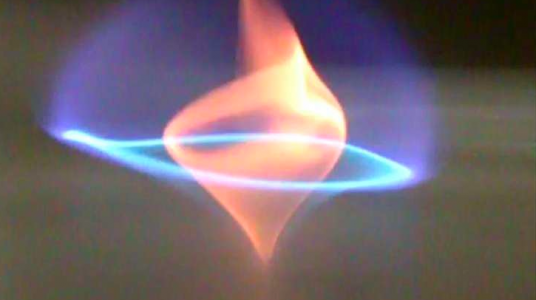Scientists Discover a New Type of Blue Eco-Friendly Fire - Dispatch Weekly
August 9, 2016 - Reading time: 3 minutes

Scientists have discovered a new type of blue flame tornado, which could lead to cleaner ways of burning fuel.
Fire whirls are caused when heat rises and winds combine to create a tornado of flames. Researchers came across the blue whirl flame when making fire whirls in the laboratory.
Yellow flames are said to be unclean, meaning the reaction is a sign of incomplete combustion that results in fires and smoke. The blue is an indicator of a cleaner burn, as there are fewer emissions.
Researcher, Huahua Xiao said, “It’s really a very exciting discovery that offers important possibilities both within and outside of the research lab.”
Exciting Possibilities
In a paper from the University of Maryland, engineers found that the blue flame could have a positive and exciting impact on society by reducing emissions from combustion calls. This could lead to alternative technologies for high-efficiency and low-emission combustion.
Fires have disastrous results on environments whereas the blue flame shows an “unexploited potential for highly efficient, low emission combustion.”
When studying fire whirls over water for oil-spill cleanup, the engineers came across the beautiful swirling flame, which evolved from a fire whirl and burnt with a nearly soot-free combustion.
The paper added, “Understanding and control of the blue whirl and its predecessor, the fire whirl will suggest new ways for fuel-spill remediation, reduced-pollution combustion, and fluid mechanics research.”

Impact
Fire whirls cause massive damage to the environment each year throughout the world.
The study could have a significant impact on the efficiency of fire whirls for oil-spill remediation, which is not only damaging for the environment but it is also costly and time consuming.
The blue flame indicates soot-free burning leading to cleaner combustion which is useful to reduce emissions from wanted and unwanted fires.
The two areas that this research will affect most are: reduced-emission combustion and fuel-spill cleanup.

DW Staff
David Lintott is the Editor-in-Chief, leading our team of talented freelance journalists. He specializes in covering culture, sport, and society. Originally from the decaying seaside town of Eastbourne, he attributes his insightful world-weariness to his roots in this unique setting.

_1.jpg)


